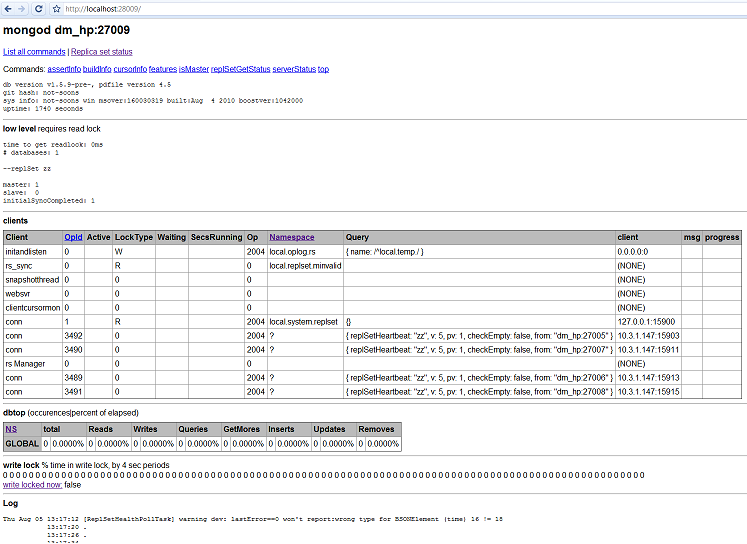HTTP Interface
发布于 2015-09-14 15:14:45 | 403 次阅读 | 评论: 0 | 来源: 网络整理
REST Interfaces¶
DrowsyDromedary (Ruby)¶
DrowsyDromedary is a REST layer for MongoDB based on Ruby.
MongoDB Rest (Node.js)¶
MongoDB Rest is an alpha REST interface to MongoDB that uses the MongoDB Node Native driver.
Mongodb Java REST server¶
Mongodb Java REST server based on Jetty.
HTTP Interfaces¶
Sleepy Mongoose (Python)¶
Sleepy Mongoose is a full featured HTTP interface for MongoDB.
HTTP Console¶
MongoDB provides a simple http interface listing information of interest to administrators. This interface may be accessed at the port with numeric value 1000 more than the configured mongod port. The default port for the http interface is 28017. To access the http interface an administrator may, for example, point a browser to http://localhost:28017 if mongod is running with the default port on the local machine.

Here is a description of the informational elements of the http interface:
| element | description |
|---|---|
| db version | database version information |
| git hash | database version developer tag |
| sys info | mongod compilation environment |
| dblocked | indicates whether the primary mongod mutex is held |
| uptime | time since this mongod instance was started |
| assertions | any software assertions that have been raised by this mongod instance |
| replInfo | information about replication configuration |
| currentOp | most recent client request |
| # databases | number of databases that have been accessed by this mongod instance |
| curclient | last database accessed by this mongod instance |
| Cursors | describes outstanding client cursors |
| master | whether this mongod instance has been designated a master |
| slave | whether this mongod instance has been designated a slave |
| initialSyncCompleted | whether this slave or repl pair node has completed an initial clone of the mongod instance it is replicating |
| DBTOP | Displays the total time the mongod instance has devoted to each listed collection, as well as the percentage of available time devoted to each listed collection recently and the number of reads, writes, and total calls made recently |
| dt | Timing information about the primary mongod mutex |
Simple REST Interface¶
The mongod process includes a simple REST interface, with no support for insert/update/remove operations, as a convenience – it is generally used for monitoring/alerting scripts or administrative tasks. For full REST capabilities we recommend using an external tool such as Sleepy.Mongoose.
v1.4+: This interface is disabled by default. Use --rest on the command line to enable.
To get the contents of a collection (note the trailing slash):
http://127.0.0.1:28017/databaseName/collectionName/
To add a limit:
http://127.0.0.1:28017/databaseName/collectionName/?limit=-10
To skip:
http://127.0.0.1:28017/databaseName/collectionName/?skip=5
To query for {a : 1}:
http://127.0.0.1:28017/databaseName/collectionName/?filter_a=1
Separate conditions with an &:
http://127.0.0.1:28017/databaseName/collectionName/?filter_a=1&limit=-10
Same as db.$cmd.findOne({listDatabase:1}) on the admin database in the shell:
http://localhost:28017/admin/$cmd/?filter_listDatabases=1&limit=1
To count documents in a collection:
http://host:port/db/$cmd/?filter_count=collection&limit=1
JSON in the simple REST interface¶
The simple ReST interface uses strict JSON (as opposed to the shell, which uses Dates, regular expressions, etc.). To display non-JSON types, the web interface wraps them in objects and uses the key for the type. For example:
# ObjectIds just become strings
"_id" : "4a8acf6e7fbadc242de5b4f3"
# dates
"date" : { "$date" : 1250609897802 }
# regular expressions
"match" : { "$regex" : "foo", "$options" : "ig" }
The code type has not been implemented yet and causes the DB to crash if you try to display it in the browser.
See Mongo Extended JSON for details.
Replica Set Admin UI¶
The mongod process includes a simple administrative UI for checking the status of a replica set.
To use, first enable --rest from the mongod command line. The rest port is the db port plus 1000 (thus, the default is 28017). Be sure this port is secure before enabling this.
Then you can navigate to http://<hostname>:28017/ in your web browser. Once there, click Replica Set Status (/_replSet) to move to the Replica Set Status page.
